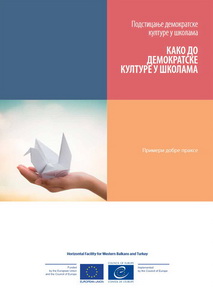 The final conference of the first part of the project “Supporting Democratic Culture in Schools” was held on 5 March 2019 at the Zemun Gymnasium. The project was implemented as part of the programme framework of the European Union and the Council of Europe under the title Horizontal Facility for Western Balkans and Turkey, implemented by the Department of Education of the Council of Europe in cooperation with the Council of Europe Office in Belgrade. The project, which lasted 24 months, was implemented in partnership with the Ministry of Education, Science and Technological Development, with the inclusion of a broad group of stakeholders, including institutes for educational policy and research, select pilot schools, local communities, media, civil sector, experts and other international organizations and partners in Serbia.
The final conference of the first part of the project “Supporting Democratic Culture in Schools” was held on 5 March 2019 at the Zemun Gymnasium. The project was implemented as part of the programme framework of the European Union and the Council of Europe under the title Horizontal Facility for Western Balkans and Turkey, implemented by the Department of Education of the Council of Europe in cooperation with the Council of Europe Office in Belgrade. The project, which lasted 24 months, was implemented in partnership with the Ministry of Education, Science and Technological Development, with the inclusion of a broad group of stakeholders, including institutes for educational policy and research, select pilot schools, local communities, media, civil sector, experts and other international organizations and partners in Serbia.
The goal of the project is raising the quality of education through promoting a democratic culture in the formal education system through the use of anti-discriminatory approaches based on the standards and practices of the Council of Europe.
A total of 12 primary schools, 4 vocational secondary schools and 4 gymnasiums from Serbia have been selected for participation in the project, showing readiness to fully promote the concept of democratic culture in school through education, training, raising awareness, information, practice and diverse activities with the aim of enabling students to exercise and defend their democratic rights and responsibilities in society, to value diversity and have an active role in democratic life, i.e. to promote democracy and the rule of law.
Schools worked to improve inclusion and expand measures to eliminate prejudice and discriminatory approaches towards vulnerable groups, as well as to resolve cases of violence through strategic plans and policies containing special measures for combating discrimination and mechanisms for monitoring such measures.
A publication on good practice examples was also published as part of the project, covering examples in three areas:
- Teaching activities,
- Extracurricular activities,
- Cooperation with the local community.
The project implementers are hoping that the publication “How to Create a Democratic Culture in Schools: Good Practice Examples” in the English and Serbian language will provide support to all schools to make such examples a continuous practice, and that the process of improving democratic culture in schools becomes an obligation of all those with ties to the school.
The Ministry of Education, Science and Technological Development, in cooperation with the Council of Europe, will continue to provide support to schools through the second phase of the project starting in May 2019, with 40 additional schools taking part with the aim of increasing the quality of the educational system and improving society.
Sources: www.mpn.gov.rs, zuov.gov.rs
 Government of the Republic of Serbia
Government of the Republic of Serbia















 pdf [271 KB]
pdf [271 KB]
Leave a Comment